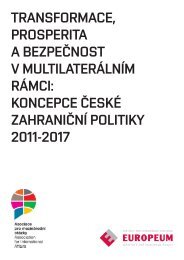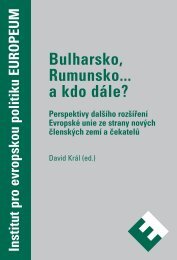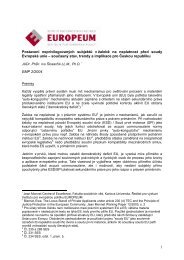eu constitutionalisation - EUROPEUM Institute for European Policy
eu constitutionalisation - EUROPEUM Institute for European Policy
eu constitutionalisation - EUROPEUM Institute for European Policy
You also want an ePaper? Increase the reach of your titles
YUMPU automatically turns print PDFs into web optimized ePapers that Google loves.
Chapter 5: The <strong>European</strong> Constitution and the Re<strong>for</strong>m of External Competencesresponsible <strong>for</strong> external relations and to create the post of a UnionMinister <strong>for</strong> Foreign Affairs (Art. I-28 CT). The Foreign Minister, whois to be appointed by the <strong>European</strong> Council with the agreement of theCommission President, shall simultaneously be one of the Vice-Presidentsof the Commission and chair the Foreign Affairs Council.¹¹ His/her tasksinclude conducting the Union’s common <strong>for</strong>eign and security policy, aswell as the common security and defence policy, which he/she shall carryout as mandated by the Council of Ministers. In his responsibility as VicePresident of the Commission, he/she shall ensure the consistency of theUnion’s external action and shall be responsible <strong>for</strong> handling externalrelations and <strong>for</strong> coordinating other aspects of the Union’s external action(Art. I-28 CT). As Griller observes, however, it is doubtful whether theostensible uni<strong>for</strong>mity of the Foreign Minister’s post could compensate <strong>for</strong>the weaknesses inherent in the draft, as the rules applicable to the CFSPand the other areas of external action <strong>for</strong>ming part of the current first pillarhave not been consolidated.¹² Despite the outwardly unified structure,basically the same (considerable) differences regarding the procedures,legal instruments, and organs involved in the decision making processapply as is presently the case. Given the frequent tensions between thetwo institutions, the Foreign Minister would face considerable difficultiesin reconciling diverging political interests. To represent a coherent pictureof the Union towards the outside world would, there<strong>for</strong>e, constitutethe major challenge and, at the same time, the essence of the ForeignMinister’s task. To this end, the Union delegations, which represent theUnion in third countries and international organisations, would also beplaced under his authority (Art. III-328 CT).¹³Given this considerable workload, much of the Foreign Minister’s successwould depend on the efficient installation of the <strong>European</strong> ExternalAction Service (hereinafter: EEAS), which was <strong>for</strong>eseen <strong>for</strong> his assist-11) The CT proposes to legally anchor the establishment of a specific Foreign Affairs Council (Art. I-24 para3), <strong>for</strong>mally distinct from the General Affairs <strong>for</strong>mation, which will be headed by the Foreign Minister.12) Compare GRILLER (2003) in: DE WITTE, p. 142ff.13) At present, both the Council and Commission represent the EU in third countries – on the one hand bythe diplomatic representation of the country holding the Presidency and, on the other hand, by the EUdelegations represented in 128 third countries. By introducing a single legal personality, the delegations,which are currently mandated by the Community, would become veritable Union delegations. As Duke,points out, it is not clear under the draft Constitution, who assumes the <strong>for</strong>mer role of the Presidencyregarding its diplomatic representative function. He argues, however, that the changes in the institutionalstructure will have the effect of considerably eroding the significance of the Presidency in external relations(DUKE, 2003, p.19).150Chapter 5: The <strong>European</strong> Constitution and the Re<strong>for</strong>m of External Competencesance. It would be composed of officials from relevant departments ofthe General Secretariat of the Council and of the Commission, as well asstaff seconded from national diplomatic services and support the ForeignMinister in “fulfilling his mandate” (Art III-296 para 3 CT). The institutionalembedding of the EEAS and the scope of its tasks, however, is not specifiedin the CT and remains subject to <strong>European</strong> decision. With a view toits composition, it might serve as the ideal <strong>for</strong>um <strong>for</strong> the practical realisationof the consistency obligation of Council and Commission in the fieldof external action (Art. III-292 CT). In this respect, it would certainly beenlightening, under whose authority, or respectively structural affiliation,the EEAS were established, the Council’s or the Commission’s or,alternatively, whether it rested solely under the authority of the ForeignMinister. Notably, the EEAS currently constitutes the most prominenttouchstone, of whether “cherry-picking” of the CT will become politicalreality or not. There are strong voices within the Community thatopt <strong>for</strong> establishing the EEAS, in order to strengthen the structure andcoherence of <strong>European</strong> <strong>for</strong>eign policy – independent of the CT’s andthus the Foreign Minister’s fate. Given their intimate link, however, theabsence of the Foreign Minister would also call the logic of having anEEAS into question.¹⁴In summary, it seems almost needless to say that the Foreign Minister wouldhold an enormously influential position in the future institutional framework.With a view to the powers unified in this single new post, it must alsobe observed, however, that the Foreign Minister would hold the potentialof policy determination and execution in one hand, which might considerablyblur the separation of powers with the Union’s institutions.¹⁵In this regard, the Foreign Minister’s relationship to the President of the<strong>European</strong> Council and the Commission President is an issue of interest<strong>for</strong> the inter-institutional balance in the CT. Both have considerablecompetences in the field of external relations and the division of labouris not clearly delimitated. The proposed permanent <strong>European</strong> Councilchair shall be elected <strong>for</strong> a, once renewable, two and a half year term. The<strong>European</strong> Council President “shall, at his or her level and in that capacity,ensure the external representation of the Union on issues concerning its common14) DUKE (2005), p.17.15) GRILLER (2003), p.147.151








